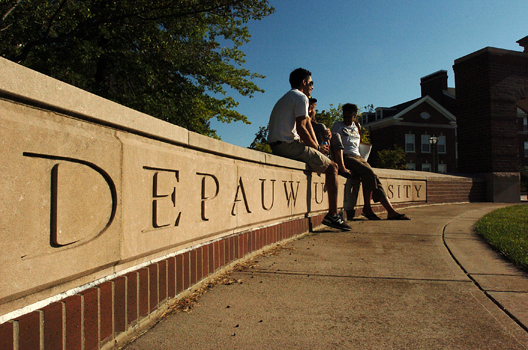
Editor's Note: The Asbury Critic is a featured column written and submitted by Prindle Institute for Ethics interns. The opinions expressed in this and other pieces are that of the author, and do not reflect the opinions of
Look on your works, Old DePauw, and despair. Long ago, you educated people to strategize in the C-suite, to argue before the Supreme Court, and to go boldly to the stars. Now, you, Mighty, must bear the sight of your children confined to more modest aspirations, perhaps sand farmer or armchair revolutionary. I thought as much when reading a recent letter by Stephen Martin ‘67 in The Greencastle Banner Graphic. In the open letter to DePauw’s Board of Trustees, published September 28th, Martin deplores the deterioration of DePauw and demands diligence from the trustees: “This board needs to dig in and drill down … You hired this administration. You are responsible for their performance.”
His bluntness might win few points for friendliness, but he deserves praise for modeling good dialogue. In this regard, he outshines much commentary critical of the university, particularly of the new School of Business and Leadership (“the Business School”). In his critique, Martin offers something more valuable than Hoosier politeness: respect. He tacitly affirms the trustees’ capability of doing good. By contrast, some current students (whom, to be fair, I admire for their zealous love for DePauw and for whom I write in the spirit of friendly conversation) cannot say the same. Beneath their noble slogans lurks cynicism.
These detractors of the Business School concur that the Board of Trustees is a cabal of capitalists, moribund alumni who, vampire-like, suck the blood of the living students. These wretches defund bona fide liberal arts initiatives to satiate the insatiable Business School, which, the dissenters hold, profits the trustees. I used to hear it would pay them exorbitant salaries. Then, I was told their dividend will be a shiny new line on their resumes. More recently, I read on YikYak, the spring of truth, that it is a charade to replace minority students with white ones, ensuring higher alumni donations tomorrow and lower scholarship payouts today. In short, the Board has ulterior motives behind its big Business School agenda.
This is what I refer to as cynicism: the suspicion that the serpents of the Board are surreptitiously siphoning off the school’s silver and slithering away with it to the bank. To be clear, one can worry about the consequences of the new Business School for good, honest reasons; I see nothing inherently immoral even in fearing that the Business School will subjugate the liberal arts to the callous calculus of cash payment and sweep the humanities into the dustbin of history. Rather, my qualms are with the conviction that the Business School is part of a conspiracy.
Unwarranted suspicion betrays the ideal of a liberal arts education, for the liberal arts require critical thought. To this end, a careful examination of bias is justified, even necessary. For instance, while reading Karl Marx’s Capital, a liberal artist must understand nineteenth-century English working conditions and how this milieu informed his outlook. However, thoughtful criticism and callous cynicism are not the same. They are opposites. Cynicism is not the thorough analysis of perspective. It is the hasty assumption of malice in others. It is the dark doppelganger of naivety, parading itself as astute intellectuality. The opposite of blind trust is not blind mistrust.
Consider the trustees, perhaps Janet Prindle-Seidler, namesake of the Janet Prindle Institute for Ethics. If you think about who she is, every accusation levied against the trustees crumbles. It is alleged these suits seek profit: she (like the rest) is unpaid, and she gave more through her gift of the Prindle Institute than she could ever gain by institutional plunder. Maybe, they want better resumes: she is retired, and, even if she were not, recall she was the pioneer of socially responsible investing on Wall Street, an achievement against which her service on the Board sounds, frankly, boring. It would be a waste of time for her to type it onto her resume. Now, you may retort that what is true of a member of a group is not always true of the group as a whole. I refer you again to the school’s website. Search “Depauw.edu.” Click the “About” tab. Now, “President White.” Next, select “Leadership & Boards.” Finally, “Board of Trustees.” Hic Rhodus, hic salta.
Next, you may protest that if we choose to trust plutocrats, they may be dishonest actors, and we will become their useful idiots. Unopposed, they will annihilate the humanities and extirpate the liberal arts. You might syllogize, “cynicism is pragmatism is prudence.” In response, listen to those of us who agree with Whitman that prudence is more than locking your door at night but rather involves the right ordering of ends and principles. If you accept that cynicism is antithetical to our ideals, then however pragmatic it may seem, embracing it to save the liberal arts is imprudent. It is lightening the boat by removing the hull. If cynicism wins, then the liberal arts are already lost, and nothing at DePauw is worth saving.
We don’t live in a Ralph Ellison novel. Don’t fear the machinations of a Dr. Bledsoe, nor even play activist. Instead, lead from the bottom-up, trusting the trustee’s good intentions, despite your doubts. You may criticize, but keep it sober. Let your newfound trust guide your behavior. Take classes in the humanities. Apply for a Prindle Institute internship. Run for president in a student club. Or, start a new one. Encourage your friends to follow suit. What motive do you have to fulfill such duties if you believe your efforts will be sabotaged by moneyed vipers? Rather, do these deeds with the confidence that two centuries of DePauw students stand behind you. If you do, DePauw may shine in splendor for posterity, enjoying the fruits of your persistence and maturity.
